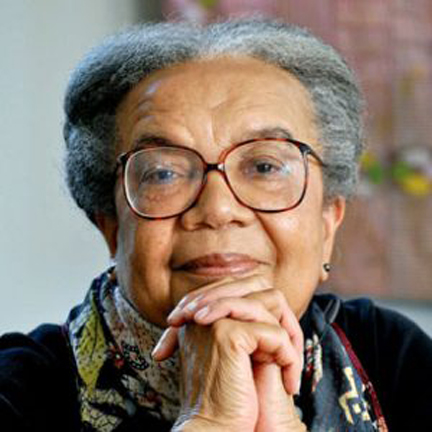Washington, D.C. — Growing up in segregated Bennettsville, South Carolina, I was blessed to have parents who always tried to be and expose us to good role models. Daddy believed in learning by example, exposure, and osmosis, and would pile us children into our old Dodge and drive us to hear and meet great Black achievers whenever they came within 200 miles of our hometown. I heard the great Dr. Mary McLeod Bethune speak at Benedict College in Columbia, South Carolina.
I remember as if yesterday how she completely commanded the dinner table recounting stories about straightening out white folks as I sat listening as a young girl. When a white hat shop clerk attempted to prevent her from trying on a hat—the usual Southern treatment of Black customers who were expected to look, buy, but not try on clothes or sit down for lunch while shopping—she brushed aside the shocked clerk’s refusal with “Do you know who I am? I am Dr. Mary McLeod Bethune!” It was from her that I first heard the saying, “The blacker the berry the sweeter the juice.” She exuded pride in her God-painted Black skin. The power of her forceful personality in a room—even one mostly full of men who listened very attentively to her—never left me. She was confident about who she was, proud of what she had achieved, and never ashamed of where she came from.
The daughter of formerly enslaved parents, she built Bethune-Cookman College on top of a garbage dump with faith, will, and an initial investment of $1.50. She was the founder of the National Council of Negro Women. Eleanor Roosevelt was her friend, and through her Dr. Bethune would transmit messages to President Franklin Roosevelt that “The President needs to see me!” One of my favorite Bethune stories was her reply to a white train conductor who called her “Auntie” and asked whether she could cook biscuits. She replied, “I am Dr. Mary McLeod Bethune. I am a college president, a founder of a national women’s organization, and a friend of the President of the United States. And yes, I also can cook good biscuits.” I remembered this decades later when I was sitting in an Aspen, Colorado restaurant, peacefully reading a book over a cup of coffee, when a white woman interrupted me to say she was looking for a maid and ask if I was interested. I asked how much she was paying and then told her what I would cost. I was not as gracious as Dr. Mary McLeod Bethune.
Dr. Bethune reinforced my parents’ message that racial and gender barriers should never be more than momentary inconveniences to be challenged by will and action. I’m delighted that her legacy is now breaking barriers again. Every state chooses two statues of prominent citizens to be included in the U.S. Capitol’s National Statuary Hall Collection. On October 11th a statue of Dr. Bethune was unveiled in Daytona Beach, Florida and will be installed in the Capitol early next year. Dr. Bethune will become the first African American to have a state-commissioned statue in Statuary Hall. Her statue was created from a block of marble culled from the same quarry used for Michelangelo’s David by Nilda Comas, the first Hispanic woman sculptor to create a statue for Statuary Hall. Dr. Bethune’s statue representing Florida will replace one of a Confederate general, which will make her smile in Heaven.
The unveiling coincided with a Washington Post article highlighting a national study of nearly 50,000 public monuments that found “more mermaids than congresswomen, more Confederates than abolitionists.” The research comes from the Monument Lab’s National Monument Audit, which seeks to help “transform the way our country’s histories are told in public spaces and ensure that future generations inherit a commemorative landscape that venerates and reflects the vast, rich complexity of the American story.” Exposing children and all of us to great role models through national, state, and local monuments matters.
I am pleased that school desegregation heroines and civil rights pioneers Daisy Bates and Barbara Johns will soon represent Arkansas and Virginia in Statuary Hall. They join busts of Dr. Martin Luther King, Jr. and Sojourner Truth and statues of Rosa Parks and Frederick Douglass Congress previously placed in the Capitol to begin to mitigate states’ omissions of African Americans. Other states have added more women and other heroes of color. Dr. Bethune is once again at the forefront of transforming change.
An earlier statue of Dr. Mary McLeod Bethune in Washington, D.C.’s Lincoln Park, funded by the National Council of Negro Women in 1974, was the first statue erected on public land in our nation’s capital to honor an African American and a woman. The memorial shows her handing a paper symbolizing her legacy to two children with these words: “I leave you love. I leave you hope. I leave you the challenge of developing confidence in one another. I leave you a thirst for education. I leave you a respect for the use of power. I leave you faith. I leave you racial dignity. I leave you a desire to live harmoniously with your fellow men. I leave you finally, a responsibility to our young people.” Dr. Bethune’s words and legacy must continue to guide us today.






